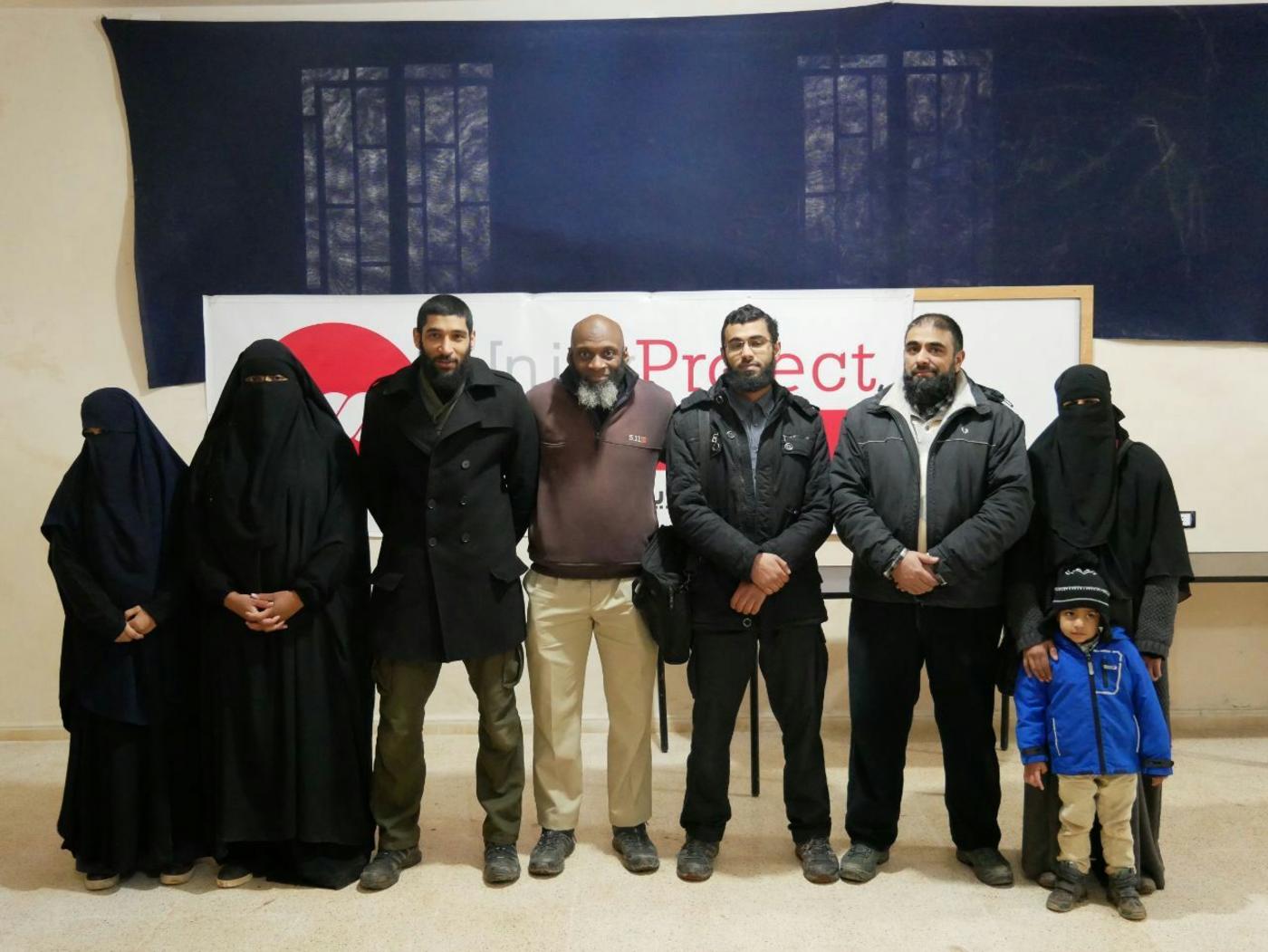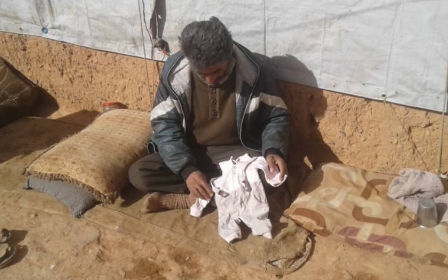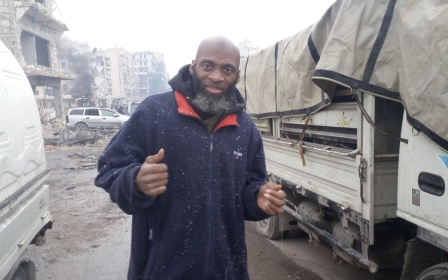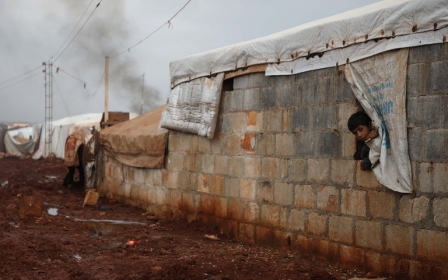Stranded foreign nationals in Idlib unite to fight for their rights back home
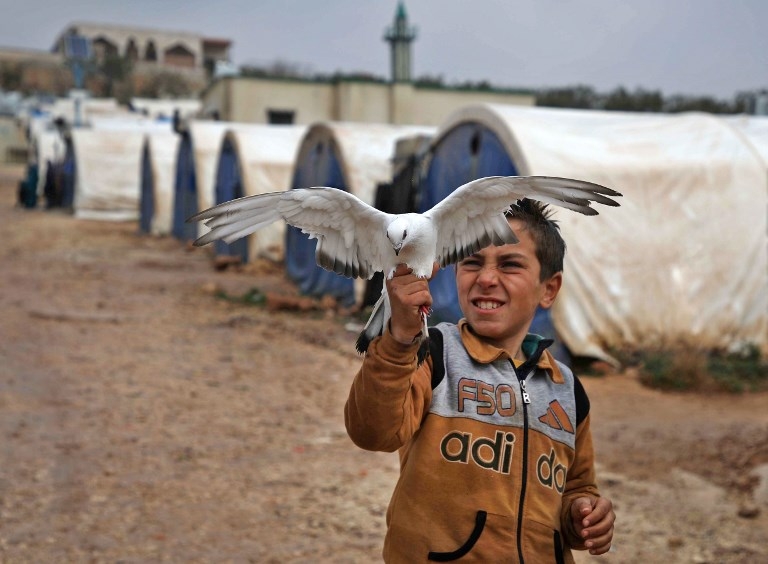
Foreign aid workers and other civilian expatriates in the Syrian opposition-held province of Idlib have established a new network to support themselves in their work and in legal battles with their own governments.
Speaking at the launch of the Unity Project on Thursday, American journalist Bilal Abdul Kareem said that the Unity Project would aim to "boost the civilian sector" in Idlib by bringing together expatriates providing aid and other services to refugees and local Syrian residents.
"This is an umbrella organisation that is designed to bring in expatriates who came here to help the Syrian people to come together under a unified banner," said Kareem, who described himself as the general manager of the Unity Project in a press conference broadcast via Skype.
Most of our governments are either trying to kills us, would like for someone else to kill us, or would be quite happy to see us dead
- Bilal Abdul Kareem, general manager of the Unity Project
Kareem said there were thousands of non-Syrian nationals who had travelled to opposition-held areas of Syria since the country's uprising against Syrian President Bashar al-Assad began in 2011.
"I felt it was my duty and my obligation to come here and report," he said. "Some came to fight, some came to do aid work, some came to teach, and some came to be journalists."
New MEE newsletter: Jerusalem Dispatch
Sign up to get the latest insights and analysis on Israel-Palestine, alongside Turkey Unpacked and other MEE newsletters
Membership of the Unity Project is open to individuals who currently independent of other groups, including former fighters with no current connections with armed groups. Kareem said about 350 people had joined the network so far, including a number of British aid workers.
Many are now effectively unable to leave Idlib, the last Syrian opposition-held province, which is now mostly under the control of the Hayat Tahrir-al Sham (HTS) militant group, because of suspicion over their activities and the threat of arrest in their home countries.
HTS is a coalition of opposition fighters that is considered a terrorist group in countries including the US and the UK because it contains factions who formerly belonged to the al-Qaeda-aligned Nusra Front, one of the main opposition forces for much of Syria's war.
'We want to give them a voice'
A key focus of the Unity Project would be providing legal assistance to members, Kareem said. Another aim would be securing passports and nationality rights for the children of expatriates born in Syria.
Middle East Eye has previously reported on the cases of British aid workers in Syria who have been stripped of citizenship by the UK government and are currently involved in legal appeals.
"The Unity Project can act as an advocate to bring some rights back to some of the people who have either lost their citizenship or lost their passports," Kareem told MEE.
"Most of the governments are gambling on the fact that the people on the receiving end of these punishments won't fight back and we want to give them a voice and see what happens."
Many of those affected had arrived in Syria as young adults, he said.
"It's unfortunate that these kids were made to make a decision. You either help the Syrian people, in which case you will have to leave everything you've ever known behind, or you watch them burn in the sand. I just do not think that is a very fair choice."
MEE has also reported on Kareem's own law suit against the US government which he accuses of placing him on an alleged "kill list" and of targeting him with air strikes on several occasions in 2016.
The journalist has covered Syria's war from opposition-held areas since 2012 and gained widespread recognition for his reporting, including for MEE, in 2016 from rebel-held eastern Aleppo during the final weeks of an assault on the besieged enclave by pro-Syrian government forces.
Wealth of extensive experience
Tauqir Sharif, a British aid worker based in the Atmeh refugee camp close to the Turkish border since 2012, said that Unity Project had been set up "for those who are independent and working in the civilian sector to support the Syrian people".
"There is a wealth of extensive experience, qualifications and skills sets," he said. "Our aim is to bring together people who have proven track records so they can help people in a more consistent way."
Sharif said that Westerners based in Syria had been vulnerable to persistent attacks about their motives for being there.
They've brought the world's attention through their work
-Emad Aldeen, an HTS spokesperson
"Many have tried to label us as jihadists, Islamists, fundamentalists, radicalised. We will not conform and neither will we allow ourselves to be labelled."
More than two million people in Idlib, many of them displaced from other areas of Syria during the country's eight-year civil war, are estimated to rely on humanitarian aid.
Refugees living in camps along the Turkish border told MEE that they appreciated the work that foreign volunteers were performing, and recognised the sacrifices they had made to live among them.
"Sometimes foreign relief or medical workers here are more friendly and genuine in their work, they're more dedicated, smiley and playful with the children in the camp," said Adnan Sheik al-Ashra, a 36-year-old father of five from Homs who has been living in Atmeh for the past four years.
"I feel relieved when I see them coming to distribute relief or coming to the camp's schools to conduct activities with children.
"It's heartwarming to see those people leaving their comfortable lives and coming to help us here."
Jamela Haj Ahmad, a 31-year-old mother of two young boys living in the Dair Balot camp, said: "They are well respected in the community. We know the sacrifices they have made for our sakes.
"You recognise them at once by their accents. Whenever I see them it gives me hope in the world because I know there will always be someone to stand beside us in our struggle."
Growing uncertainty
Foreign nationals in Idlib are facing growing uncertainty over their future with Syrian government forces and their allies regaining and consolidating control over much of the rest of the country, and threatening to launch a new assault on opposition fighters massed in the province.
Russia, Assad's main ally, and Turkey last month also agreed to take action against HTS, which Ankara pledged to disarm and remove from Idlib as part of an earlier deal to avert a Syrian government assault.
Human rights monitors have also raised concerns about the activities of HTS and the Salvation Government, the HTS-backed civilian administration in Idlib.
Last week, Human Rights Watch accused HTS of arbitrarily detaining and torturing scores of opponents of their rule in Idlib, including journalists and activists.
Kareem told MEE that HTS had mostly left foreign aid workers in Idlib alone.
"I think groups like HTS and the Salvation Government see the work we do as important for the Syrian people. They generally don't get in the way," he said.
Emad Aldeen, an HTS spokesperson, told MEE that foreign aid workers and civilians were treated as part of the community with the same rights as Syrians, especially those working in the medical and refugee sectors.
"They're supporting the community, they came here to help and do what they could to alleviate the suffering of our people who they believe are their brothers and sisters in Islam and humanity," he said.
"Sometimes they are doing that better than us, and they've brought the world's attention through their work."
An influx of refugees and fugitive fighters from formerly Islamic State-held territory in eastern Syria has also stoked security concerns, with many foreign aid workers taking out additional security because of kidnapping fears.
Last month, a British aid worker, Mohammed Shakiel Shabir, was freed by HTS fighters after being held for six weeks by an armed gang that demanded $4m for his release.
Kareem said that the Unity Project had already been working on the ground in support of its members for the past six months, and that foreign nationals recognised the dangers they faced.
"There are all these kidnappings and assassinations, not including the fact that most of our governments are either trying to kill us, would like for someone else to kill us, or would be quite happy to see us dead, so the threat is real."
Middle East Eye delivers independent and unrivalled coverage and analysis of the Middle East, North Africa and beyond. To learn more about republishing this content and the associated fees, please fill out this form. More about MEE can be found here.


